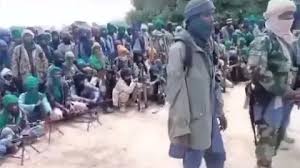Opinion
Bandits: The criminals who wanted to be ‘The Lords of Nigeria’s North West’

Banditry primarily affects rural communities, which are responsible for food security, and has disrupted socio-economic life in the North West. Nigeria has a long history of violent conflicts, dating back to the Middle Belt ethno-political conflicts of the 1960s.
Following the return to democratic governance in 1999, there was an increase in the number of violent non-state actors and their dominance of national and sub-national security agendas. Ethnic militants, gangs and cult groups, political thugs, and other groups are now among the armed non-state actors.

In agitating against the established sociopolitical order, such groups take advantage of the relative freedom provided by democratic governance, particularly the repeal of restrictive military-era laws, such as the notorious Decree 2 of 1984, which allowed the government to detain citizens deemed a threat to national security, and Decree 13 of 1984, which prohibited citizens from challenging the government.
The emergence of Boko Haram in 2002 only pushed some of these groups to the periphery of national and regional security priorities.
Bandits are the newest addition to Nigeria’s growing list of violent non-state actors, and they have become a convenient trope for framing the ongoing devastation in the North West and Middle Belt regions of the country.
Banditry in Nigeria can be traced back to the farmer-herder conflict that accelerated around 2011. It is largely unrelated to the Boko Haram insurgency in the North East. Since 2011, the farmer-herder conflict has spread to include cattle rustling, arms smuggling, protection rackets, ransom kidnapping, and gender-based violence, among other things.
Banditry has had a devastating impact on local populations. According to a 2019 report by the Zamfara State government, bandits killed at least 6,319 people, kidnapped 3,672 people, and burned down more than 500 villages in Zamfara State alone between 2011 and 2019.
Bandit activities have also displaced over 200,000 people, with over 35,000 Nigerians forced to emigrate to the Niger Republic as a result of bandit destruction of their communities. Bandits are said to have killed more Nigerians than Boko Haram, robbers, kidnappers, and cultists combined, accounting for 47.5% of all violent deaths in 2019.

Because of the severity of their attacks on communities and citizens, policymakers, security agencies, media outlets, and citizens have demanded that these groups be classified as terrorists rather than bandits.
To emphasize the gravity of the security situation in the North West, media outlets frequently use the terms “bandits” and “terrorists” interchangeably to describe criminal gangs accused by communities of murders, ransom-driven kidnappings, sexual violence, and other violent crimes.
Are bandits, on the other hand, terrorists? Or, to put it another way, is banditry the latest form of terrorism? Do definitions have any bearing? Is there any legal, public policy, security, or regional ramifications to labelling acts of violence, particularly in Nigeria’s northwest region, as acts of terrorism?
Whatever position one takes, there is a noticeable trend, particularly among journalists and political office holders, to switch definitions based on the number of casualties and the intensity of the attack.
However, this approach is problematic because it shifts the security and political focus of relevant stakeholders, including policymakers, away from the issues and concepts that distinguish terrorism from banditry and toward treating both as incidents of attack.
According to several studies, bandits are a diverse group of criminal gangs who engage in large-scale cattle rustling, sexual violence, kidnapping, armed robbery, pillage, and attacks on gold miners and traders, particularly in northwest Nigeria.
Bandit groups are primarily made up of Nigerians from the Fulani and Hausa ethnic groups, as these criminal gangs are the result of local conflicts between farmers and herders. Furthermore, the presence of non-Nigerians within bandit groups is due to the North West sharing more than 900 kilometres of poorly policed international border with the Niger Republic.
Bandits operate in independent clusters that are neither cohesive nor have formalized command structures, as opposed to militias, which typically have formalized structures and identities. Apart from opportunities for pillaging, inter-group conflicts, and turf wars, these gangs have little in common.
These criminal gangs operate in rural communities and have bases deep in forests, which provide excellent hiding places. Profit and personal enrichment are the primary motivators of these criminal gangs, not the advancement of any political and/or ideological agenda.
In northwest Nigeria, a region plagued by poverty and a lack of socioeconomic opportunities, banditry offers lucrative and alluring opportunities. Furthermore, funds obtained from kidnapping for ransom fuel the trade in small arms and light weapons, as well as lubricating transnational crime in the Sahel region as a whole.
These criminal gangs have targeted communities of various faiths and ethnicities throughout the North West. Representatives of Fulani herder communities claim that bandits have kidnapped hundreds of their members and that attacks have resulted in the loss of 30% of cattle. These gangs have ransacked tens of rural farming communities, killing thousands of farmers.
These bandits became a thorn in the flesh to the Nigerian government and they looked like criminals whose intention was to dominate Nigeria’s North West. As it stands, that plan may not be fruitful because the Nigerian military troop is making them learn the hard way.
We have seen positive results after the shutting down of telecommunications networks in some parts of Nigeria. But Nigerians still await a day in which these bandits would be declared terrorists.

























